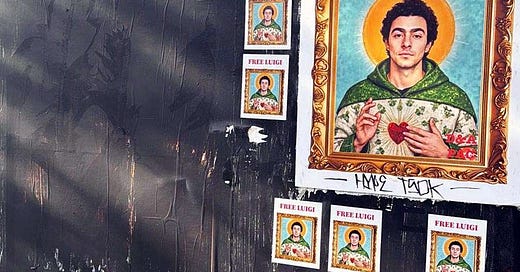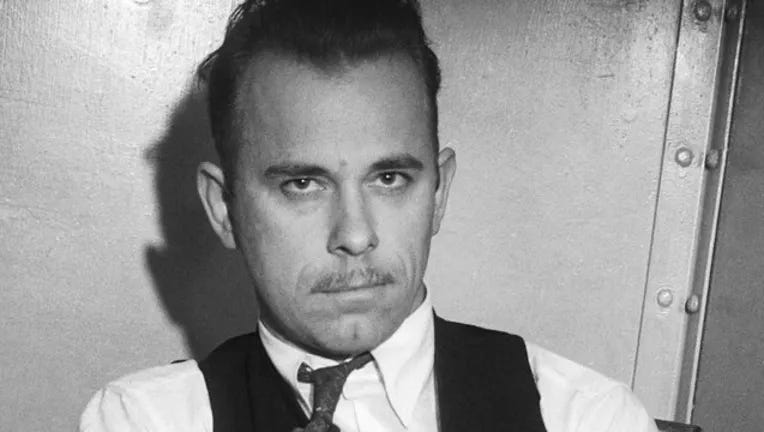It is shocking for some that UnitedHealthcare CEO Brian Thompson’s accused killer, Luigi Mangione, has a devoted fanbase.
“The seething anger underneath showed you that Luigi, at least for a certain part of the population, has tremendous support,” former Trump White House strategist Steve Bannon said. “When you get to that point, it should be flashing red that we have a problem.”
A problem, perhaps, but certainly not a new one.
Mangione is simply the beneficiary of the American affinity for “righteous” outlaws.
The United States is a complicated, mercurial oddity, as tolerant of acts of incredible violence as it is capable of unprecedented acts of benevolence. It’s a historical marvel — a country settled and tamed by religious zealots, outlaws, orphans, fortune-seekers, bastards, and refugees, each in pursuit of self-determination. America’s DNA is equal parts felon, evangelist, beggar, and conqueror. Yet rather than any one of these strains emerging as supreme, they have, over centuries, comingled, making it possible for the American public to hold contradictory positions such as, “Murder is terrible except for when it’s not.”
The truth is America is a messy, wild country filled with messy, wild people, many of whom will tolerate and cheer violence — even murder — so long as they believe it targets a greater evil. It’s this American inclination that has made folk heroes of so many killers, including those who cropped up suddenly during the Great Depression.
Bonnie Parker and Clyde Barrow enjoyed popular support even during their multistate crime spree. They were celebrated as “romantic Robin Hoods,” their sins often overlooked or downplayed in favor of a narrative that framed them as agents of justice against the excesses and cruelty of the banks. (The romanticized version of the duo was also popularized by a news media eager to sensationalize the story for the benefit of depression-weary audiences.) Never mind that Bonnie and Clyde were no anti-bank crusaders but, rather, sociopaths who targeted mainly backroad shops, grocery stores, and gas stations. By the time they were gunned down in 1934, the couple had murdered 13 people. Yet their funeral attracted more than 10,000 onlookers, far more than can be explained by idle curiosity.
Even today, in Bienville Parish, Louisiana, where law enforcement officers killed Bonnie and Clyde, public opinion of the duo is split. In the Bienville Parish Journal, author Brad Dison wrote in 2023 that whenever he asks locals about the killer couple, these are the most common responses:
“They weren’t as bad as people said they were.”
“They didn’t do all of the things the newspapers said they did.”
“They were good people.”
“They got what they deserved.”
“They were nothing but white trash.”
“They cared for nobody but themselves.”
That’s not all.
John Dillinger, whose gang murdered 10 people and wounded seven more, was likewise seen as a righteous vigilante for targeting banks. His popular support grew such that, in 1934, when theater newsreels reported his criminal exploits, “audiences across America cheered when Dillinger’s picture appeared on the screen” and “hissed at pictures” of Division of Investigation agents (the DOI was a predecessor to the FBI).
Nearly 10,000 people attended Dillinger’s wake.
Charles Arthur Floyd, known best as “Pretty Boy Floyd,” murdered at least two people and may have been involved in at least four additional murders. Yet, because he robbed banks, he was seen in his time as a “Robin Hood figure, beloved of America’s dispossessed and downtrodden of the Great Depression,” according to the Oklahoma Historical Society.
One paper even dubbed him the “Robin Hood of the Cookson Hills.”
“During his crimes,” reports the Carnegie Public Library, “[he] was so well thought of by the community that he could walk around in public unmolested and even went to church in Earlsboro.”
Woody Guthrie tried to immortalize Floyd in song, repeating the myth that the trigger-happy thief would tear up mortgages during his bank heists.
The song goes:
Then he took to the trees and timber
To live a life of shame;
Every crime in Oklahoma
Was added to his name.But a many a starving farmer
The same old story told
How the outlaw paid their mortgage
And saved their little homes.
Etcetera, etcetera.
Floyd was shot and killed by police officers in 1934. More than 20,000 people attended his funeral.
Even further back, before the Great Depression, the American public’s soft spot for “righteous” outlaws is evident in its support for real-life criminals such as Billy the Kid and Jesse James. Both were hailed as anti-corruption crusaders, taking on crooked lawmen and avaricious bankers. Never mind that Mr. The Kid and James’s kill counts were approximately 10 and three, respectively.
Then, there are the more recent examples of Bernie Goetz and Gary Plauché, whose stories prove the point that a significant number of Americans will support incredible violence so long as the target is considered a worse evil.
Goetz shot four men during the height of the New York City crime epidemic in the 1980s, claiming the men were trying to rob him. None of the four died, though one was paralyzed permanently. Plauché executed his son’s rapist, putting a bullet in his head at point-blank range. Goetz, who enjoyed immense popular support for his actions, was convicted only of criminal possession of a handgun and served less than a year in jail. Plauché served no time at all.
Given America’s historical affection for “righteous” violence, it’s no surprise that Mangione should enjoy a devoted following. His fans believe he struck a justified and necessary blow against the evils of private health insurance. Mangione’s popularity may be many things, but unique and unprecedented it is not.
America isn’t drifting into dark, uncharted waters. Its people are merely reacting in their usual fashion.
But don’t despair that your neighbor might celebrate Luigi Mangione. Marvel instead that a country with such a tolerance for violence and lawlessness should exist in the first place. Marvel further that such a country is also capable of historical acts of magnanimity, such as the Marshall Plan.
America is a wild, messy, wonderous place, home to CEO-killer and G-man alike.







I do take comfort that I am a consistent stick in the mud. Can't stand the Mangione love. And I loved the film The Highwaymen for how it deglamorized Bonnie and Clyde. Solid Dad(tm) movie too.